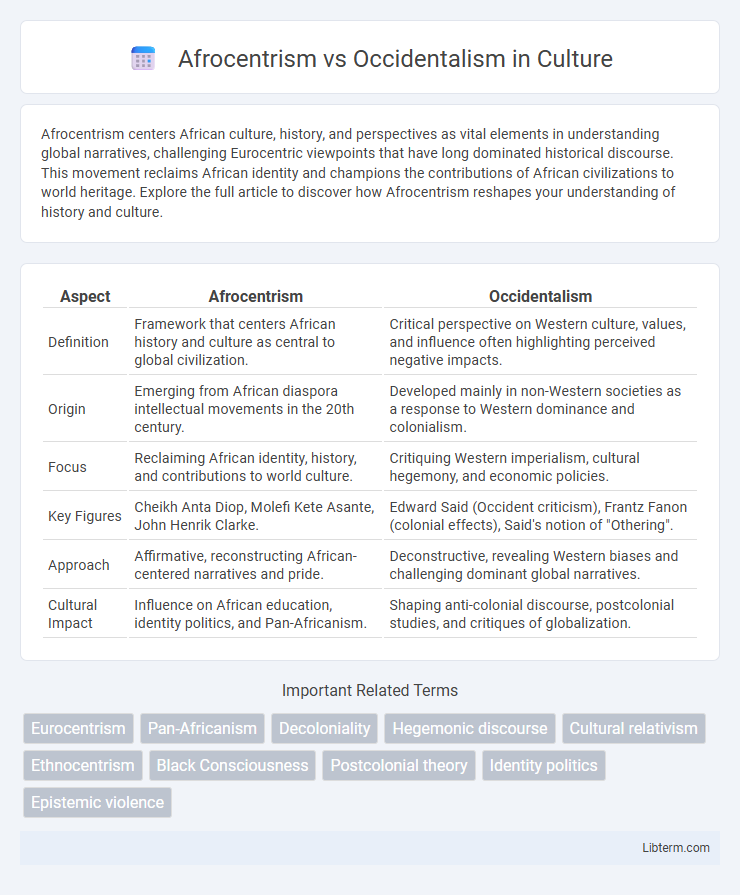Afrocentrism centers African culture, history, and perspectives as vital elements in understanding global narratives, challenging Eurocentric viewpoints that have long dominated historical discourse. This movement reclaims African identity and champions the contributions of African civilizations to world heritage. Explore the full article to discover how Afrocentrism reshapes your understanding of history and culture.
Table of Comparison
| Aspect | Afrocentrism | Occidentalism |
|---|---|---|
| Definition | Framework that centers African history and culture as central to global civilization. | Critical perspective on Western culture, values, and influence often highlighting perceived negative impacts. |
| Origin | Emerging from African diaspora intellectual movements in the 20th century. | Developed mainly in non-Western societies as a response to Western dominance and colonialism. |
| Focus | Reclaiming African identity, history, and contributions to world culture. | Critiquing Western imperialism, cultural hegemony, and economic policies. |
| Key Figures | Cheikh Anta Diop, Molefi Kete Asante, John Henrik Clarke. | Edward Said (Occident criticism), Frantz Fanon (colonial effects), Said's notion of "Othering". |
| Approach | Affirmative, reconstructing African-centered narratives and pride. | Deconstructive, revealing Western biases and challenging dominant global narratives. |
| Cultural Impact | Influence on African education, identity politics, and Pan-Africanism. | Shaping anti-colonial discourse, postcolonial studies, and critiques of globalization. |
Defining Afrocentrism and Occidentalism
Afrocentrism centers African history, culture, and values as the primary lens for interpreting global events, challenging Eurocentric narratives that have historically marginalized African contributions. Occidentalism critiques Western dominance by deconstructing Western ideologies, cultural practices, and political frameworks, positioning non-Western perspectives in opposition to Western hegemony. Both frameworks seek to reframe historical and cultural understandings, emphasizing identity, power dynamics, and epistemological sovereignty from their respective viewpoints.
Historical Roots of Afrocentrism
Afrocentrism emerged in the late 20th century as a response to Eurocentric narratives, aiming to re-center African history and culture by emphasizing indigenous African perspectives and contributions. Its historical roots trace back to Pan-Africanism and the Harlem Renaissance, where intellectuals like W.E.B. Du Bois and Cheikh Anta Diop challenged colonial depictions of Africa as a continent of inferiority. Afrocentrism reclaims African identity by highlighting ancient civilizations such as Egypt and Mali, countering Occidentalism's often stereotypical views rooted in Western dominance.
The Foundations of Occidental Thought
The foundations of Occidental thought are deeply rooted in Enlightenment principles emphasizing rationalism, individualism, and scientific progress, shaping Western philosophy and cultural identity. Afrocentrism challenges these Eurocentric narratives by centering African history, values, and epistemologies as primary sources of knowledge and cultural pride. This contrast highlights a critical discourse on power, representation, and the validity of knowledge systems between Western intellectual traditions and African-centered perspectives.
Core Philosophies Compared
Afrocentrism centers on reclaiming African heritage by emphasizing indigenous African values, history, and perspectives as foundational to identity and knowledge systems, challenging Eurocentric narratives that have marginalized African contributions. Occidentalism critiques Western dominance by deconstructing the cultural, political, and economic hegemony imposed by Europe and North America, often portraying Western modernity as a source of exploitation and cultural alienation. Both philosophies seek to reshape worldview paradigms, with Afrocentrism focusing on cultural revival and pride within African contexts, while Occidentalism critically assesses Western influence and advocates for alternative global perspectives.
Representation in Education and Academia
Afrocentrism emphasizes African perspectives and histories as central frameworks in education and academia, challenging Eurocentric narratives and promoting representation of African cultures and contributions. Occidentalism critiques Western dominance and seeks to deconstruct the paradigms that prioritize Western knowledge, urging inclusion of marginalized voices in academic curricula. Both frameworks advocate for a more balanced representation that addresses historical biases and fosters intellectual diversity in educational institutions.
Cultural Identity and Self-Perception
Afrocentrism centers African cultural identity by reclaiming history and redefining self-perception through an African-centered worldview, challenging Eurocentric narratives. Occidentalism critiques Western cultural dominance by exposing colonial legacies and advocating for alternative self-definitions rooted in non-Western traditions. Both paradigms emphasize cultural empowerment and resist imposed identities to foster authentic self-perception and collective identity formation.
Influence on Art, Literature, and Media
Afrocentrism emphasizes reclaiming African heritage, inspiring a resurgence of African motifs, oral traditions, and spiritual themes in contemporary art, literature, and media, fostering pride and cultural identity among African diasporas. Occidentalism often critiques Western dominance by challenging Eurocentric narratives, leading to alternative representations that question colonial legacies and promote indigenous voices in storytelling and visual culture. The dynamic interplay between Afrocentrism and Occidentalism influences global creative expressions, reshaping cultural landscapes through diverse perspectives on history, identity, and resistance.
Critiques and Controversies: A Dual Perspective
Afrocentrism faces critiques for sometimes promoting a romanticized or essentialist view of African history that may overlook internal complexities and global interactions. Occidentalism is often criticized for fostering anti-Western sentiment and simplifying Western societies into monolithic oppressors, which can hinder constructive dialogue. Both perspectives encounter controversies around identity politics, historical interpretation, and their impact on geopolitics, revealing challenges in balancing cultural pride with nuanced analysis.
Modern Social and Political Impacts
Afrocentrism challenges Eurocentric narratives by reclaiming African history and identity, empowering marginalized communities and influencing contemporary social justice movements. Occidentalism critiques Western dominance and cultural imperialism, fueling political discourse on decolonization and reshaping global power dynamics. Both frameworks drive debates on heritage, representation, and policy in multicultural societies.
Toward a Dialogue: Bridging Afrocentrism and Occidentalism
Toward a Dialogue: Bridging Afrocentrism and Occidentalism emphasizes the critical need to foster mutual understanding between these intellectual traditions by highlighting their shared goals of deconstructing Eurocentric narratives. This approach encourages a balanced exchange that respects Afrocentric affirmations of African cultural identity while critically engaging Occidentalism's critique of Western dominance and ideology. Such dialogue promotes nuanced perspectives, facilitating collaborative efforts in reshaping global historiography and cultural discourse.
Afrocentrism Infographic

 libterm.com
libterm.com